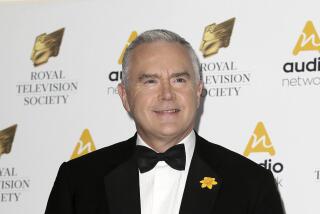The BBC’s Stiff Upper Lip Quivers : Soap Opera Becomes a Laughingstock
- Share via
LONDON — “Eldorado,” a new television series from the august British Broadcast Corp., is one of those rare programs that come along every now and again and set a whole nation to talking.
In the scant two months since its much ballyhooed launch on British TV, “Eldorado” has probably garnered more media attention and generated more laughs than most series do over the course of years. All of Great Britain is howling.
Trouble is, it’s not a comedy.
“Eldorado” is a big-budget, prime-time soap opera about British expatriates and other assorted Euro-types who have left their native countries to live amid the sun-splashed surroundings of Spain’s Costa del Sol. “Together they all face the same question,” says the BBC press release. “Can life here live up to the fabled promise of the Spanish City of Gold? Or will their dreams wither and die in the searing Spanish heat?”
Making sure no one misses the point, the BBC publicity adds, helpfully, “Eldorado’s days and nights will be devoted to sun, sand, sangria--and, of course, sex.”
The series was designed to boost the BBC’s sagging ratings and prove that the generally highbrow broadcasting giant knows how to provide popular entertainment.
It hasn’t quite worked out that way. Ridiculing “Eldorado” has become a major sport; watching it has not. While there is much guffawing going on in the pubs, the tabloid newspapers and other places where great national issues are debated, the ratings for “Eldorado” remain paltry.
Nor have the reviews been particularly good. “Repellent,” said the Daily Mail, in one characteristic example.
The show has been criticized for bad acting, stereotyped characters, dumb dialogue, boring plots and even poor sound quality.
It’s been called “Helldorado,” “El-bore-ado,” “Disasterado” and a hundred other jokingly derisive nicknames. It is frequently pointed out that the letters of the title can be rearranged to spell “Real Dodo.”
After “Murphy Brown” was awarded
several Emmy Awards in the wake of Vice President Dan Quayle’s criticism of the show, one British newspaper ran a cartoon showing BBC executives wondering how they could get Quayle to denounce “Eldorado.”
And in the most recent public humiliation of the show, a brand of recycled toilet paper has launched a billboard advertising campaign that features a roll of its product next to the headline “In my previous life I was an Eldorado script.”
All this mirth and merriment does not appear to extend to the offices of the BBC’s programming department, where executives already have committed tens of millions of dollars to the program. Shooting on location in Spain with a core cast much larger than most soaps, the BBC spent $8 million just to construct an authentic “village” in the hills near Marbella. The total annual budget for the show is $20 million, according to BBC officials.
Although the BBC is maintaining a calm exterior, it is generally believed that the series has caused tremendous embarrassment there and may scuttle the careers of several top executives.
Says a BBC spokesman, “Things are starting to look up. We’re confident.”
Meanwhile, there has been a flurry of behind-the-scenes activity. Executive producer and creator Julia Smith has left the series because of “exhaustion.” Jonathan Powell, the head of BBC-1, the mainstream BBC channel that broadcasts “Eldorado,” flew to the set in Spain for a morale-boosting session. An acting coach has been sent. A dialogue coach has been sent. Actors are getting axed.
Whether the BBC can get out of this mess remains to be seen. But it’s not difficult to see how it got into it. It was soap power.
In Britannia, soaps rule the airwaves. Great Britain’s television networks may offer hours of highbrow dramas, documentaries and cultural programming, but, truth be known, soap operas are what most people actually watch.
Actually, there are two kinds of programs that dominate the British television ratings--English soaps and Australian soaps. The English variety (“Coronation Street” and “EastEnders”) follow the stories of working-class people who reside in gritty urban neighborhoods. The Australian imports (“Neighbors” and “Home and Away”) take the standard melange of tangled romance and dark secrets and add beaches, sunshine, suburban lawns and a slightly more upscale cast of characters.
British viewers also were glued to the U.S. soaps “Dallas” and “Dynasty” with their tales of American decadence in the 1980s. But, while those series went out with the Reagan era, the Anglo-Aussie soap quartet continues to draw the greatest viewership each week in Britain, making them the top four programs in the nation.
“Eldorado” created controversy even before the first episode was broadcast. There were complaints that the non-commercial BBC--which is funded primarily by a $160 annual license fee on each TV household--should not invest such huge sums on a form of television programming that is hardly underrepresented. Other critics complained that the BBC should spend its time producing more upscale programs.
With the BBC’s government charter set to expire at the end of 1996, debate has been raging inside and outside the broadcasting corporation over what its role should be in the future. There appears to be a strong movement toward transforming the BBC into a leaner entity with an even stronger emphasis on upscale, cerebral programming.
But there also are strong advocates of the idea that the BBC should produce programs that appeal to all segments of society, not just the elite.
“The BBC has to have a wide range of programming if it’s going to justify the license fee,” says Maggie Brown, media editor of the British newspaper, the Independent.
BBC-1 chief Powell contends that the funds used to produce “Eldorado” are well-spent. “All our research shows people want news from us and they want good quality fiction,” he told reporters just before the soap premiered. “At the heart of the schedule you need popular drama because it is that which creates the strongest possible bond between a channel and its audience, and that is tremendously important for the BBC.”
That may well be true. But the word circulating through media circles is that he would be wise to start dusting off his resume.
More to Read
The complete guide to home viewing
Get Screen Gab for everything about the TV shows and streaming movies everyone’s talking about.
You may occasionally receive promotional content from the Los Angeles Times.






